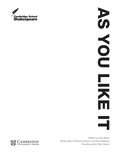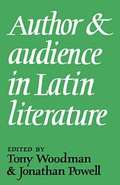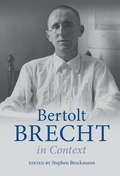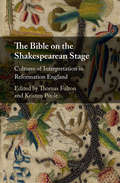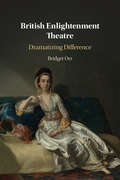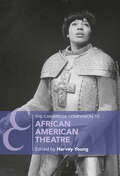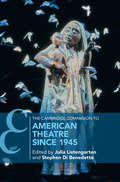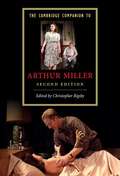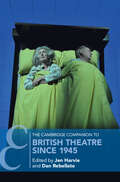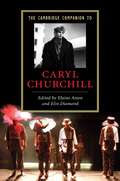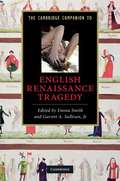- Table View
- List View
As You Like It
by Linzy Brady Richard Andrews Vicki Wienand & Rex GibsonMichael Hattaway's Introduction to this bestselling edition of As You Like It accounts for what makes this popular play both innocent and dangerous. This third edition includes a new section on recent critical interpretations, including sections on ecocriticism, peace studies, and myths of gender, on recent as well as past stage productions and films of the play, as well as fresh illustrations. An appendix on an early court performance in 1599, commentary on the play's language, the book trade, and the discursive cultures of its time, as well as an updated reading list are also included.
As You Like It (The New Cambridge Shakespeare)
by William Shakespeare Michael HattawayShakespeare's As You Like It can appear bright or sombre in performance: a feast of language and a delight for comic actors; or a risk-taking exploration of gender roles. This updated edition provides an account of what makes this popular play both innocent and dangerous. There is a section on recent critical, stage and film interpretations of the play, an updated reading list and a new appendix on an early court performance of As You Like It in 1599. Mapping the complexities of the play's setting - a no man's land related to both France and England, the edition also includes detailed commentary on its language and an analytical account of performance.
Augustine's Inner Dialogue: The Philosophical Soliloquy in Late Antiquity
by Brian StockAugustine's philosophy of life involves mediation, reviewing one's past and exercises for self-improvement. Centuries after Plato and before Freud he invented a 'spiritual exercise' in which every man and woman is able, through memory, to reconstruct and reinterpret life's aims. Brian Stock examines Augustine's unique way of blending literary and philosophical themes. He proposes a new interpretation of Augustine's early writings, establishing how the philosophical soliloquy (soliloquium) has emerged as a mode of inquiry and how it relates to problems of self-existence and self-history. The book also provides clear analysis of inner dialogue and discourse and how, as inner dialogue complements and finally replaces outer dialogue, a style of thinking emerges, arising from ancient sources and a religious attitude indebted to Judeo-Christian tradition.
Author and Audience in Latin Literature
by Tony Woodman Jonathan PowellThe relationship between the author and his audience has received much critical attention from scholars in non-classical disciplines yet the nature of much ancient literature and of its 'publication' meant that audiences in ancient times were more immediate to their authors than in the modern world. This book contains essays by distinguished scholars on the various means by which Latin authors communicated effectively with their audiences. The authors and works covered are Cicero, Catullus, Lucretius, Propertius, Horace's Odes, Virgil's Aeneid, Ovid's Metamorphoses, Senecan tragedy, Persius, Pliny's letters, Tacitus' Annals and medieval love lyric. Contributors have provided detailed analyses of particular passages in order to throw light on the many different ways in which authors catered for their audiences by fulfilling, manipulating and thwarting their expectations; and in an epilogue the editors have drawn together the issues raised by these contributions and have attempted to place them in an appropriate critical context.
Bertolt Brecht in Context (Literature in Context)
by Stephen BrockmannBertolt Brecht in Context examines Brecht's significance and contributions as a writer and the most influential playwright of the twentieth century. It explores the specific context from which he emerged in imperial Germany during the late nineteenth and early twentieth centuries, as well as Brecht's response to the turbulent German history of the twentieth century: World Wars One and Two, the Weimar Republic, the Nazi dictatorship, the experience of exile, and ultimately the division of Germany into two competing political blocs divided by the postwar Iron Curtain. Throughout this turbulence, and in spite of it, Brecht managed to remain extraordinarily productive, revolutionizing the theater of the twentieth century and developing a new approach to language and performance. Because of his unparalleled radicalism and influence, Brecht remains controversial to this day. This book – with a Foreword by Mark Ravenhill – lays out in clear and accessible language the shape of Brecht's contribution and the reasons for his ongoing influence.
The Bible on the Shakespearean Stage: Cultures Of Interpretation In Reformation England
by Kristen Poole Thomas FultonThe Bible was everywhere in Shakespeare's England. Through sermons, catechisms, treatises, artwork, literature and, of course, biblical reading itself, the stories and language of the Bible pervaded popular and elite culture. In recent years, scholars have demonstrated how thoroughly biblical allusions saturate Shakespearean plays. <P><P>But Shakespeare's audiences were not simply well versed in the Bible's content - they were also steeped in the practices and methods of biblical interpretation. Reformation and counter-reformation debate focused not just on the biblical text, but - crucially - on how to read the text. The Bible on the Shakespearean Stage is the first volume to integrate the study of Shakespeare's plays with the vital history of Reformation practices of biblical interpretation. Bringing together the foremost international scholars in the field of 'Shakespeare and the Bible', these essays explore Shakespeare's engagement with scriptural interpretation in the tragedies, histories, comedies, and romances.<P> The first volume to integrate the study of Shakespeare's plays with the vital history of Reformation practices of biblical interpretation.<P> Brings together some of the foremost international scholars in the field of 'Shakespeare and the Bible'.<P> Explores Shakespeare's engagement with scriptural interpretation across the tragedies, histories, comedies, and romance.
British Drama of the Industrial Revolution
by Frederick BurwickBetween the advent of the French Revolution and the short-lived success of the Chartist Movement, overworked and underpaid labourers struggled to achieve solidarity and collective bargaining. That history has been told in numerous accounts of the age, but never before has it been told in terms of the theatre of the period. To understand the play lists of a theatre, it is crucial to examine the community which that theatre serves. In the labouring-class communities of London and the provinces, the performances were adapted to suit the local audiences, whether weavers, or miners, or field workers. Examining the conditions and characteristics of representative provincial theatres from the 1790s to 1830s, Frederick Burwick argues that the meaning of a play changes with every change in the performance location. As contributing factors in that change, Burwick attends to local political and cultural circumstances as well as to theatrical activities and developments elsewhere.
British Enlightenment Theatre: Dramatizing Difference
by Bridget OrrIn this ground-breaking work, Bridget Orr shows that popular eighteenth-century theatre was about much more than fashion, manners and party politics. Using the theatre as a means of circulating and publicizing radical Enlightenment ideas, many plays made passionate arguments for religious and cultural toleration, and voiced protests against imperial invasion and forced conversion of indigenous peoples by colonial Europeans. Irish and labouring-class dramatists wrote plays, often set in the countryside, attacking social and political hierarchy in Britain itself. Another crucial but as yet unexplored aspect of early eighteenth-century theatre is its connection to freemasonry. Freemasons were pervasive as actors, managers, prompters, scene-painters, dancers and musicians, with their own lodges, benefit performances and particular audiences. In addition to promoting the Enlightened agenda of toleration and cosmopolitanism, freemason dramatists invented the new genre of domestic tragedy, a genre that criticized the effects of commercial and colonial capitalism.
The Cambridge Companion to African American Theatre (Cambridge Companions to Theatre and Performance)
by Harvey YoungThis new edition provides an expanded, comprehensive history of African American theatre, from the early nineteenth century to the present day. Including discussions of slave rebellions on the national stage, African Americans on Broadway, the Harlem Renaissance, African American women dramatists, and the New Negro and Black Arts movements, the Companion also features fresh chapters on significant contemporary developments, such as the influence of the Black Lives Matter movement, the mainstream successes of Black Queer Drama and the evolution of African American Dance Theatre. Leading scholars spotlight the producers, directors, playwrights, and actors who have fashioned a more accurate appearance of Black life on stage, revealing the impact of African American theatre both within the United States and around the world. Addressing recent theatre productions in the context of political and cultural change, it invites readers to reflect on where African American theatre is heading in the twenty-first century.
The Cambridge Companion to African American Theatre
by Harvey YoungThis Companion provides a comprehensive overview of African American theatre, from the early nineteenth century to the present day. Along the way, it chronicles the evolution of African American theatre and its engagement with the wider community, including discussions of slave rebellions on the national stage, African Americans on Broadway, the Harlem Renaissance, African American women dramatists, and the 'New Negro' and 'Black Arts' movements. Leading scholars spotlight the producers, directors, playwrights and actors whose efforts helped to fashion a more accurate appearance of black life on stage, and reveal the impact of African American theatre both within the United States and further afield. Chapters also address recent theatre productions in the context of political and cultural change and ask where African American theatre is heading in the twenty-first century.
The Cambridge Companion to American Theatre since 1945 (Cambridge Companions to Theatre and Performance)
by Julia Listengarten Stephen Di BenedettoThe Cambridge Companion to American Theatre since 1945 provides an overview and analysis of developments in the organization and practices of American theatre. It examines key demographic and geographical shifts American theatre after 1945 experienced in spectatorship, and addresses the economic, social, and political challenges theatre artists have faced across cultural climates and geographical locations. Specifically, it explores artistic communities, collaborative practices, and theatre methodologies across mainstream, regional, and experimental theatre practices, forms, and expressions. As American theatre has embraced diversity in practice and representation, the volume examines the various creative voices, communities, and perspectives that prior to the 1940s was mostly excluded from the theatrical landscape. This diversity has led to changing dramaturgical and theatrical languages that take us in to the twenty-first century. These shifting perspectives and evolving forms of theatrical expressions paved the ground for contemporary American theatrical innovation.
The Cambridge Companion to Arthur Miller
by Christopher BigsbyArthur Miller is regarded as one of the most important playwrights of the twentieth century, and his work continues to be widely performed and studied around the world. This updated Companion includes Miller's work since the publication of the first edition in 1997 - the plays Mr Peters' Connections, Resurrection Blues, and Finishing the Picture, recent film adaptations, and key productions of his plays since his death in 2005. Book jacket.
The Cambridge Companion to August Wilson
by Christopher BigsbyOne of America's most powerful and original dramatists, August Wilson offered an alternative history of the twentieth century, as seen from the perspective of black Americans. He celebrated the lives of those seemingly pushed to the margins of national life, but who were simultaneously protagonists of their own drama and evidence of a vital and compelling community. Decade by decade, he told the story of a people with a distinctive history who forged their own future, aware of their roots in another time and place, but doing something more than just survive. Wilson deliberately addressed black America, but in doing so discovered an international audience. Alongside chapters addressing Wilson's life and career, and the wider context of his plays, this Companion dedicates individual chapters to each play in his ten-play cycle, which are ordered chronologically, demonstrating Wilson's notion of an unfolding history of the twentieth century.
The Cambridge Companion to Brecht
by Peter Thomson Glendyr SacksThis Companion offers students crucial guidance on virtually every aspect of the work of this complex and controversial writer, bringing together the contrasting views of major critics and active practitioners. The opening essays place Brecht's creative work in its historical and biographical context and are followed by chapters on single texts, from The Threepenny Opera to The Caucasian Chalk Circle, on some early plays, on the Lehrstücke and on the neglected contribution of Elisabeth Hauptmann to the Brecht canon. The third group of essays analyse Brecht's directing, his theatrical theories, his poetry, his interest in music, his significant collaboration with stage designers and his work with actors, concluding with an assessment of Brecht's continuing influence on theatre practice. A detailed calendar of Brecht's life and work and a selective bibliography of English criticism complete this provocative overview of a writer who constantly aimed to provoke.
The Cambridge Companion to Brian Friel
by Anthony RocheBrian Friel is widely recognized as Ireland's greatest living playwright, winning an international reputation through such acclaimed works as Translations (1980) and Dancing at Lughnasa (1990). This 2006 collection of specially commissioned essays includes contributions from leading commentators on Friel's work (including two fellow playwrights) and explores the entire range of his career from his 1964 breakthrough with Philadelphia, Here I Come! to his most recent success in Dublin and London with The Home Place (2005). The essays approach Friel's plays both as literary texts and as performed drama, and provide the perfect introduction for students of both English and Theatre Studies, as well as theatregoers. The collection considers Friel's lesser-known works alongside his more celebrated plays and provides a comprehensive critical survey of his career. This is a comprehensive study of Friel's work, and includes a chronology and further reading suggestions.
The Cambridge Companion To British Theatre, 1730-1830
by Jane Moody Daniel O'QuinnThis Companion offers a wide-ranging and innovative guide to one of the most exciting and important periods in British theatrical history. The scope of the volume extends from the age of Garrick to the Romantic transformation of acting inaugurated by Edmund Kean. It brings together cutting-edge scholarship from leading international scholars in the long eighteenth century, offering lively and original insights into the world of the stage, its most influential playwrights and the professional lives of celebrated performers such as James Quin, George Anne Bellamy, John Philip Kemble, Dora Jordan, Fanny Abington and Sarah Siddons. The volume includes essential chapters about eighteenth-century acting, production and audiences, important surveys of key theatrical forms such as tragedy, comedy, melodrama and pantomime as well as a range of exciting thematic essays on subjects such as private theatricals, 'black' theatre and the representation of empire.
The Cambridge Companion to British Theatre since 1945 (Cambridge Companions to Theatre and Performance)
by Jen Harvie Dan RebellatoBritish theatre underwent a vast transformation and expansion in the decades after World War II. This Companion explores the historical, political, and social contexts and conditions that not only allowed it to expand but, crucially, shaped it. Resisting a critical tendency to focus on plays alone, the collection expands understanding of British theatre by illuminating contexts such as funding, unionisation, devolution, immigration, and changes to legislation. Divided into four parts, it guides readers through changing attitudes to theatre-making (acting, directing, writing), theatre sectors (West End, subsidised, Fringe), theatre communities (audiences, Black theatre, queer theatre), and theatre's relationship to the state (government, infrastructure, nationhood). Supplemented by a valuable Chronology and Guide to Further Reading, it presents up-to-date approaches informed by critical race theory, queer studies, audience studies, and archival research to demonstrate important new ways of conceptualising post-war British theatre's history, practices and potential futures.
The Cambridge Companion to Caryl Churchill
by Elaine Aston Elin DiamondCaryl Churchill's plays are internationally performed, studied and acclaimed by practitioners, theatre scholars, critics and audiences alike. With fierce imagination the plays dramatise the anxieties and terrors of contemporary life. This Companion presents new scholarship on Churchill's extraordinary and ground-breaking work. Chapters explore a cluster of major plays in relation to pressing social topics - ecological crisis, sexual politics, revolution, terror and selfhood - providing close readings of texts in their theatrical, theoretical and historical contexts. These topic-based essays are intercalated with other essays that delve into Churchill's major collaborations, her performance innovations and her influences on a new generation of playwrights. Contributors explore Churchill's career-long experimentation - her risk-taking that has reinvigorated the stage, both formally and politically. Providing a new critical platform for the study of a theatrical career that spans almost fifty years, the Companion pays fresh attention to Churchill's poetic precision, dark wit and inexhaustible creativity.
The Cambridge Companion to Chekhov
by Vera Gottlieb Paul AllainThis volume of specially commissioned essays explores the world of Anton Chekhov - one of the most important dramatists in the repertoire - and the creation, performance and interpretation of his works. The Companion begins with an examination of Chekhov's life, his Russia, and the original productions of his plays at the Moscow Art Theatre. Later film versions and adaptations of Chekhov's works are analysed, with valuable insights also offered on acting Chekhov, by Ian McKellen, and directing Chekhov, by Trevor Nunn and Leonid Heifetz. The volume also provides essays on â special topics' such as Chekhov as writer, Chekhov and women, and the Chekhov comedies and stories. Key plays, such as The Cherry Orchard and The Seagull, receive dedicated chapters while lesser-known works and genres are also brought to light. The volume concludes with appendices of primary sources, lists of works, and a select bibliography.
The Cambridge Companion to Christopher Marlowe
by Patrick CheneyThe Cambridge Companion to Christopher Marlowe, first published in 2004, provides a full introduction to one of the great pioneers of both the Elizabethan stage and modern English poetry. It recalls that Marlowe was an inventor of the English history play (Edward II) and of Ovidian narrative verse (Hero and Leander), as well as being author of such masterpieces of tragedy and lyric as Doctor Faustus and 'The Passionate Shepherd to His Love'. Sixteen leading scholars provide accessible and authoritative chapters on Marlowe's life, texts, style, politics, religion, and classicism. The volume also considers his literary and patronage relationships and his representations of sexuality and gender and of geography and identity; his presence in modern film and theatre; and finally his influence on subsequent writers. The Companion includes a chronology of Marlowe's life, a note on reference works, and a reading list for each chapter.
The Cambridge Companion to David Hare
by Richard BoonDavid Hare is one of the most important playwrights to have emerged in the UK in the last forty years. This volume examines his stage plays, television plays and cinematic films, and is the first book of its kind to offer such comprehensive and up-to-date critical treatment. Contributions from leading academics in the study of modern British theatre sit alongside those from practitioners who have worked closely with Hare throughout his career, including former Director of the National Theatre Sir Richard Eyre. Uniquely, the volume also includes a chapter on Hare's work as journalist and public speaker; a personal memoir by Tony Bicât, co-founder with Hare of the enormously influential Portable Theatre; and an interview with Hare himself in which he offers a personal retrospective of his career as a film maker which is his fullest and clearest account of that work to date.
The Cambridge Companion to David Mamet
by Christopher BigsbyThis collection of specially written essays offers both student and theatregoer a guide to one of the most celebrated American dramatists working today. Readers will find the general and accessible descriptions and analyses provide the perfect introduction to Mamet's work. The volume covers the full range of Mamet's writing, including now classic plays such as American Buffalo and Glengarry Glen Ross, and his more recent work, Boston Marriage, among others, as well as his films, such as The Verdict and Wag the Dog. Additional chapters also explore Mamet and acting, Mamet as director, his fiction, and a survey of Mamet criticism. The Companion to David Mamet is an introduction which will prepare the reader for future work by this important and influential writer.
The Cambridge Companion to Edward Albee
by Stephen BottomsEdward Albee, perhaps best known for his acclaimed and infamous 1960s drama Who's Afraid of Virginia Woolf?, is one of America's greatest living playwrights. Now in his seventies, he is still writing challenging, award-winning dramas. This collection of essays on Albee, which includes contributions from the leading commentators on Albee's work, brings fresh critical insights to bear by exploring the full scope of the playwright's career, from his 1959 breakthrough with The Zoo Story to his recent Broadway success, The Goat, or Who is Sylvia? (2002). The contributors include scholars of both theatre and English literature, and the essays thus consider the plays both as literary texts and as performed drama. The collection considers a number of Albee's lesser-known and neglected works, provides a comprehensive introduction and overview, and includes an exclusive, original interview with Mr Albee, on topics spanning his whole career.
The Cambridge Companion to English Renaissance Tragedy
by Emma Smith Garrett A. Sullivan JrFeaturing essays by major international scholars, this Companion combines analysis of themes crucial to Renaissance tragedy with the interpretation of canonical and frequently taught texts. Part I introduces key topics, such as religion, revenge, and the family, and discusses modern performance traditions on stage and screen. Bridging this section with Part II is a chapter which engages with Shakespeare. It tackles Shakespeare's generic distinctiveness and how our familiarity with Shakespearean tragedy affects our appreciation of the tragedies of his contemporaries. Individual essays in Part II introduce and contribute to important critical conversations about specific tragedies. Topics include The Revenger's Tragedy and the theatrics of original sin, Arden of Faversham and the preternatural, and The Duchess of Malfi and the erotics of literary form. Providing fresh readings of key texts, the Companion is an essential guide for all students of Renaissance tragedy.
The Cambridge Companion to English Restoration Theatre
by Deborah Payne FiskThis rich and varied portrait of drama from 1660 to 1714 provides students with essential information about playwrights, staging and genres in their social and political context. The theater that followed the Restoration of Charles II is revealed in all of its tumult, energy and conflict. Contributors pay attention to major and minor playwrights, the first professional female dramatists, the performance aspects of the drama and the main dramatic genres and themes.
